The Importance of Upskilling Courses for India's Manufacturing Sector

“Get certified in just two weeks!” or “Become a professional in three months.” You might come across such social media ads promoting quick certifications for data science, digital marketing, and more, which have proliferated in recent years. Artificial Intelligence, Automation and Machine Learning have created a significant upskilling movement; but limited to IT and ITeS (IT enabled services) professionals have enjoyed its fruits while non-IT engineers have struggled to find similar opportunities especially within manufacturing sectors, leading to a wide skill gap in the manufacturing sector and a call for a nation-wide skill revolution.
Impact of Expanding IT Talent Pool on Global Recruitment Trends
Since 2015, India’s IT talent pool has seen tremendous growth; back then, the ratio between IT engineers and non-IT engineers was 1:2. Now, however, that ratio has plummeted to an alarming 1:0.7 mainly due to an imbalance in job opportunities. ITeS professionals have enjoyed an abundance of professional opportunities, whereas the manufacturing sector has struggled to keep up.
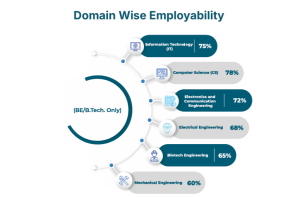
The lack of advancement in the manufacturing sector and limited opportunities in non-IT fields have driven skilled workers away from this sector. Non-IT engineers are increasingly considering careers in IT or ITeS fields such as data science, digital marketing, and other short-term courses widely available in the market because there are very few upskilling programs in manufacturing or industrial settings that align with their skill sets.
India's Manufacturing Sector Needs Restructuri
India is the world’s 4th-largest economy. Yet, it faces challenges such as low per capita income, inflation, and a high unemployment rate, with most of the population engaged in the secondary sector. Currently, the manufacturing sector contributes less than 13% to India’s GDP, whereas in developed nations, it accounts for about 30–35% of the economy. To remain competitive in its pursuit of becoming the world’s largest economy, India must build a workforce equipped to serve advanced manufacturing, the EV sector, and other sunrise industries. Upskilling and reskilling programs will play a crucial role in achieving this.
Lack of upskilling opportunities in the secondary sector exacerbates this issue further. While IT offers many short courses and certifications for upskilling purposes, fields like digital manufacturing, industrial robotics and smart manufacturing remain underdeveloped, leaving non-IT engineers few options to upskill themselves in an ever-evolving job market.
Upskilling Is Essential to India's Manufacturing Future
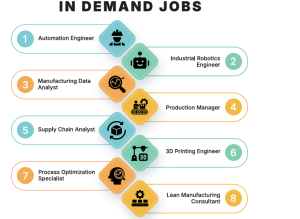
Meeting Technological Needs
As industries seek to innovate and reduce production costs, technological advancements in manufacturing are required to keep up the momentum. Specialised courses and certifications in the manufacturing sector can equip professionals with the specialized knowledge needed for these innovations. Areas such as industrial automation, smart manufacturing, and robotic operations are essential elements in India’s manufacturing ecosystem.
Government Support
Indian government initiatives aimed at boosting manufacturing, including Make in India and Atmanirbhar Bharat, along with incentives such as the Gati Shakti scheme, the PLI scheme, MSME support, and others, have significantly increased the demand for skilled workers in Advanced Manufacturing, Aerospace, Defence, EV Manufacturing, and other sunrise sectors. With such strong emphasis on upskilling in these areas, advanced manufacturing courses and training for modern, high-tech factory environments have become more essential than ever.
Emerging New Players & Sectors
India is home to many unicorns and emerging players in sectors once dominated by the government, such as Defence, Aerospace, and Electrical Manufacturing. With private players driving innovation in these fields, workers must upgrade their skills to meet the advanced and specialised demands of the modern manufacturing sector.
Addressing Skill Gaps in Manufacturing
India’s manufacturing sector faces a skills gap due to a shortage of skilled professionals. Indian manufacturing units looking to remain globally competitive must employ a workforce capable of handling cross-functional roles, innovating within their field, and adhering to global standards. Short yet in-demand certifications play a vital role in building this workforce.
Top Skills in Demand in 2025
Advanced Manufacturing, Electric Vehicle (EV), and hospitality sectors are projected to experience substantial expansion over the coming years. Below are some of the skills in demand:
1. Industrial 3D Printing: Design & Manufacturing
There is a critical shortage of professionals with expertise in Additive Manufacturing, Material Science, and design using software like Fusion 360 and Rhino. With the advent of AI and Automation increasingly integrated into 3D Printing, requiring knowledge in generative design and real-time quality controls, this skill allows you to make your idea into a reality, like agnilet of Agniban, a fully 3D printed cryogenic engine.
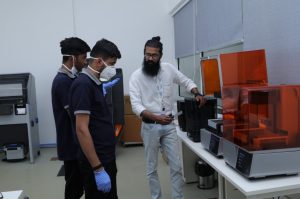
2. Industrial Automation Fundamentals
Factories and production lines are shifting to automation. It includes PLC programming, device control, and communication protocols. Industries are in dire need of a specialised workforce and will pay for the maintenance and repair of complex automation systems, including 3D printers and robotics. Less competitive than others, yet high-yielding skills.
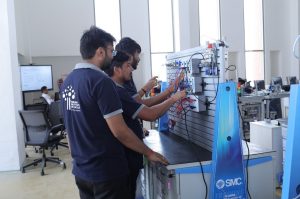
3. Robotics and Automation for Smart Factories
Robotics and Automation engineers are among the most sought-after professionals in Manufacturing, Logistics, and Healthcare. Advancing careers in smart manufacturing by mastering industrial robots, cobots, and AMRs. This skill helps one to work with robot simulation, programming, and optimization , that is a highly paid and in-demand skill around the globe.
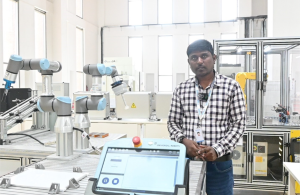
4. EV Two/Three Wheeler Service Expert
By 2025, India’s EV market is valued at ₹5.7 trillion (USD 75.04 billion), with a surge in demand for skilled technicians in two/three-wheeler servicing. Hence, proficiency in both traditional and modern EV systems, fault detection, and maintenance of electric powertrains and batteries is essential. This skill will never go outdated as EV is the future.
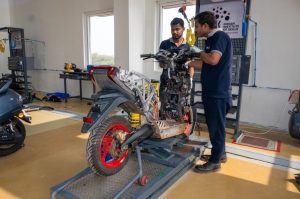
5. EV Battery Specialist
By 2025, India’s EV market is valued at ₹5.7 trillion (USD 75.04 billion), with a surge in demand for skilled technicians in two/three-wheeler servicing. Hence, proficiency in both traditional and modern EV systems, fault detection, and maintenance of electric powertrains and batteries is essential. This skill will never go outdated as EV is the future.
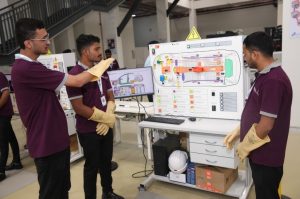
6. CNC Operations for New Age Manufacturing
The global CNC machine market is expected to reach $132 billion by 2026. Over 70% of manufacturers report difficulty hiring skilled CNC operators, emphasising the need for advanced training in CNC programming, troubleshooting, and the use of a simulator. Salaries for CNC machinists have increased by 15–20% in the last five years, reflecting high demand, which makes it an impressive skill.
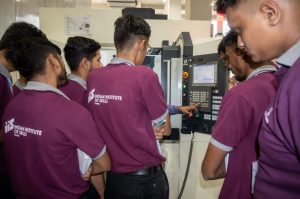
7. Advanced Arc Welding Techniques
The global arc welding equipment market is projected to reach $4.6 billion by 2025. There is a 15% projected increase in demand for welders skilled in advanced techniques and robotic welding, especially those able to work with new materials and automated systems.
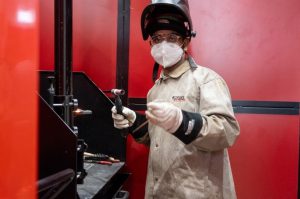
Take the Next Step with Tata IIS

Tata IIS is an initiative by the Tata Group, in partnership with the Ministry of Skill Development and Entrepreneurship (MSDE), Government of India, that is setting up IIS Mumbai and IIS Ahmedabad as world-class skilling institutes. Drawing from the Tata Group’s legacy of institution building, including IISc, TISS, and TIFR, Tata IIS is focused on creating a global benchmark for quality and relevance in vocational education.
Our goal is to shape the future by providing world-class training for emerging sectors. Tata IIS offers courses and certifications designed to give aspiring professionals the edge they need to thrive in today’s fast-paced industries. Join Tata IIS and unleash your career potential with skills that will shape tomorrow.
FAQ’s
TATA IIS offers industry-aligned training in advanced manufacturing, additive technologies, and welding for aerospace. It will surely supplement the capacity of public undertakings and private players with essential technical expertise for advanced defence manufacturing.
TATA IIS offers hands-on experience in 7 courses that include: CNC machining, 3D printing, Arc welding, industrial automation, Robotics automation, EV battery specialist and EV 2/3- wheeler service specialist, equipping students with the precision skills needed for smart and advanced manufacturing.
One needs to apply for the choice of location’s website – IIS Mumbai, IIS Ahmedabad, after which there will be an entrance test, and if you succeed, your admission gets confirmed by paying the minimal admission fees.
Indian Institute of Skills is managed by TATA IIS, and it has two campuses. One is IIS Ahmedabad, and the other is IIS Mumbai. Both are functioning at full throttle now with a complete laboratory setup with state-of-the-art facilities and equipment.
Yes, dedicated support is given to the trainees who have completed their coursework successfully. Check out the website for more information on placements.










